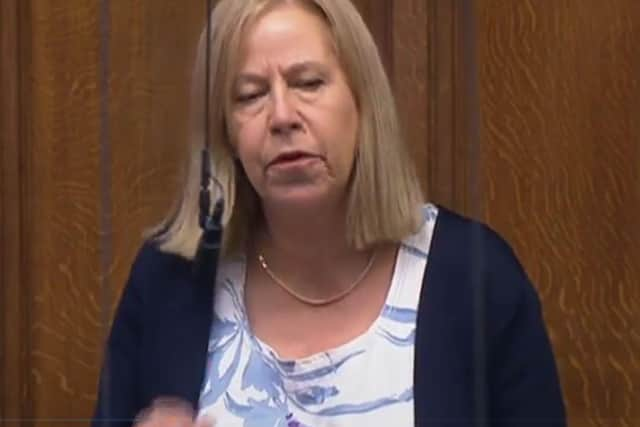Cross-party MPs urge loan charge rethink after plight of Yorkshire veteran raised in Parliament
The Yorkshire Post reported last week on the case of a military veteran from Barnsley who said being chased by HMRC for retrospective tax payments left him seriously contemplating suicide. The man has had to remortgage his home and pay 50 per cent of my disposable income to HMRC every month now until retirement.
His case was raised in Parliament by Labour MP Ruth Cadbury.
Advertisement
Hide AdAdvertisement
Hide AdShe asked Minister Jesse Norman: “We know there are many, many thousands of nurses, social workers and other public sector workers who have been caught up by the loan charge. They took work via agencies who told them basically, ‘Sign here or you don’t get the work’. Checking to see if they would be liable for the loan charge wasn’t an option.


"Last week The Yorkshire Post reported that a number of former services personnel have been affected and one is feeling suicidal as a direct result. What does the Minister say to this veteran and the thousands of other public servants whose lives have been turned upside by this retrospective taxation?”
Mr Norman replied: “Taxation is often a difficult matter for the relatively small number of individuals affected by particular pressures and of course Government recognises that and understands it. It is nevertheless the case, it is indeed a foundational principle of the tax system, that people should be responsible for their own tax returns.”
The loan charge was introduced in the 2016 Budget to address what the Treasury called a variety of “disguised remuneration” schemes. Under such schemes, individuals – often freelancers or self-employed contractors – were paid via a third party in the form of loans, replacing part or all of their salary.
Advertisement
Hide AdAdvertisement
Hide AdThe Government initially decided those entering such schemes, which dated back to 1999, had been skirting tax and demanded income tax to be paid on the full amounts received. The retrospective charges have been linked to seven suicides - with campaigners arguing they represent a ruinous financial penalty upon people who signed up in good faith to what they thought were legitimate arrangements.
In 2019, a review by senior auditor Sir Amyas Morse resulted in the Government changing the cut-off date for chasing payments from 1999 to 2010 - but many cross-party MPs have called for an end to all retrospective payments before the 2017 Finance Act.
Shadow Financial Secretary James Murray asked: “The Conservative Government’s approach to the loan charge means that ordinary people who are victims of mis-selling are suffering financial ruin and personal harm. Ministers will have heard some harrowing accounts of people pushed to the very brink and worse - some even tragically taking their own lives. This cannot be what the Government envisaged and a new approach is urgently needed. So will the Treasury now review the loan charge scheme and the approach of HMRC to prevent further devastating consequences?”
Mr Norman responded: “Both the Government and HMRC take these cases extremely seriously. That is why HMRC have put in place extra care and support for people who may be affected by tax issues of this and other kinds. But the fact remains we have had a review.
Advertisement
Hide AdAdvertisement
Hide Ad“The Labour Party has been right not to have opposed this policy at any point during its passage in Parliament.”
But Mr Norman was also challenged by Conservative MP Peter Bone on the matter.
“I think the problem that members have on both sides of this House is that ordinary people were duped into something and it has effectively become retrospective legislation. I thought the way the shadow minister approached this was very reasonable,” Mr Bone said.
“I do think the way HMRC has approached this is not the right approach. Perhaps the Government could look at that again.”
Advertisement
Hide AdAdvertisement
Hide AdMr Norman said: “As he will be aware, they have not initiated insolvency proceedings against any taxpayer for a loan charge debt and that in itself is emblematic of the care and attention with which they are taking on this subject.”
DUP MP Sammy Wilson added: “It is not enough for the Minister to say people have to take responsibility for their own tax affairs when the information they were given by HMRC was that there was nothing wrong with these schemes initially. How can the Minister say it is right to penalise people for things they were lead into and for payments which HMRC were regularising by allowing contractors to use as a means of paying their employees?”
Mr Norman said: “There were some contractors working for agencies and through agencies for HMRC and where it was discovered they had used disguised remuneration those relationships were ended. Very strong measures have been put in place to prevent recurrence and that is an unfortunate feature of the extended way in which these contract arrangements sometimes worked.
“I don’t think there is any evidence HMRC have signed off or positively approved the use of any disguised remuneration scheme.”
Advertisement
Hide AdAdvertisement
Hide AdSupport The Yorkshire Post and become a subscriber today. Your subscription will help us to continue to bring quality news to the people of Yorkshire. In return, you'll see fewer ads on site, get free access to our app and receive exclusive members-only offers. Click here to subscribe.